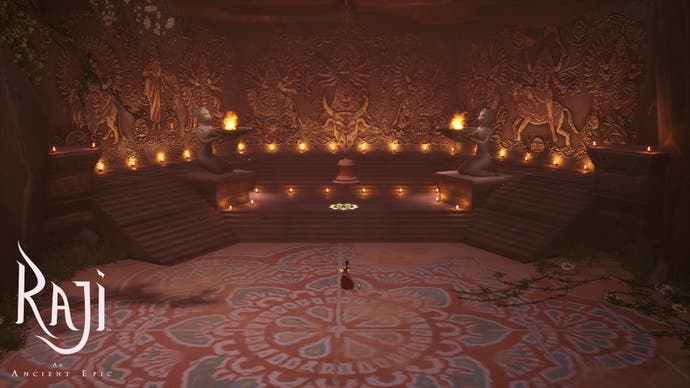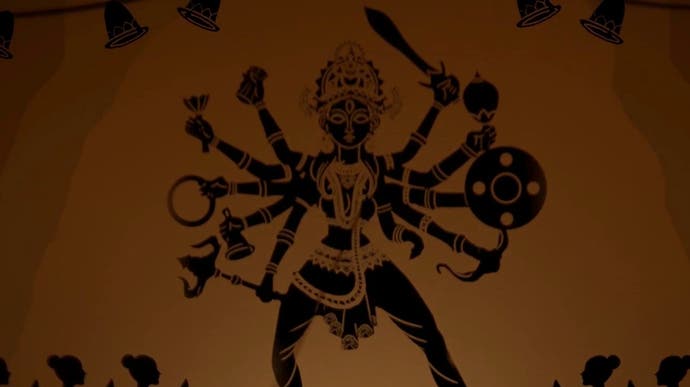Raji: An Ancient Epic review - a gorgeous adventure through architecture and myth
Night theatre.
It's always nice to meet a tree, but so often with games it's the same tree - or one of a small handful of favoured trees. Sometimes it's the Great Deku Tree, slumbering in some Hyrulian wood. Always a pleasure, Deku Tree! Often it's Yggdrasil, the great tree from Norse mythology. Yggdrasil, so wizened and melancholy. Don't get me wrong. I love these trees. Who doesn't love Yggdrasil? Who doesn't love the Deku Tree. But in Raji: An Ancient Epic, I met a new tree. First time, I'm certain of it.
At least, I think it's a tree. There are faces in it - they definitely look like faces - and there are sections to rotate and fit together. Its roots! Its roots, as they say, must hold the sky. Turn the sections, make the tree whole again. A lovely thing to toy with in between action and exploration.
Raji is one of those rare, special games that takes things and makes them new again. I'm not just talking about new trees, although that's certainly a part of it. I'm talking about action and exploration. This is a game clearly made from a love of other games. The combat invokes everything from Devil May Cry to the strikes and retreats of a Supergiant joint, and the exploration is as gymnastic and intricate as anything in Tomb Raider. Familiar things, wonderful things, but Raji delivers them in a fresh way. This is the work of a small studio in India, and it's a game built on Hindu and Balinese myths and artistic traditions. Vishnu and Durga's roving conversation shapes the narrative, cut-scenes are handled by shadow puppets or replaced entirely by the discovery of huge, vivid murals within the game world itself. And that world! Temples and grottoes and fortresses carved into mountains. One of Raji's developers recently explained that in part this game was an attempt to show people that there was more to India than the Taj Mahal. Mission accomplished.
The story is wonderfully direct. Raji is a young circus performer trying to rescue her brother who has been kidnapped. Along the way she finds herself in the middle of a war between gods and demons. This translates to a mixture of combat and platforming as she travels from one huge environment to the next on her quest.
The combat is suitably vivid. With the camera pulled back to a God's eye view, spatial concerns come to the fore as Raji must move around walled-in arenas and take on waves of demonic baddies. There's a dash alongside light and heavy attacks, and trouble often comes not just in the form of massive damage-dealing blows but stuns that allow those blows to pile up. In Raji's world, movement is everything and staying still generally means defeat.
All this is enlivened by a small group of special weapons unlocked throughout the course of the adventure, all of which handle attacks in their own distinct ways and can be tricked out with elemental magic. But more than that, the landscape works its way into battles. Raji's not bad on her own two feet, but if she can spring from a wall or backflip from a pillar there are chances to finish enemies off in double-time. Battles quickly become laboratories for experimenting with the architectural features you have to hand. There is nothing better than, limping along on your last bit of health, finding that you can rebound off a little gazebo and finish off three enemies at once, pounding them into oblivion and lighting up a mandala of fire that sears the earth beneath them.

Exploration is similarly memorable. There's nothing intrinsically new about Raji's blend of wall-running, jumping and climbing, and at times it can be a little fiddly. But I have rarely been thrust into so many places I really wanted to explore: castles of red stone, lit by the evening sun, rain-washed mountain temples, and a huge bleached and polished marble fortress built around a vast lotus lake where I could leap from lily pad to lily pad. Puzzles interrupt the flow now and then but this is ultimately a game about movement: vast environments in which you are very small but very mobile and can cover a huge amount of ground, spaces in which storytelling and a sense of place is built into the walls and the mosaic floors.
It's transporting. Raji's a shortish game but a very rich one - the sheer scale of environments and the sense of adventure is properly intoxicating. More than anything I was left with gratitude: this game gave me a window into another culture and I want to know more. I want to keep learning - there's that tree I met for starters. This game is generous and heartfelt and magical and I think it's the beginning of something brilliant.






